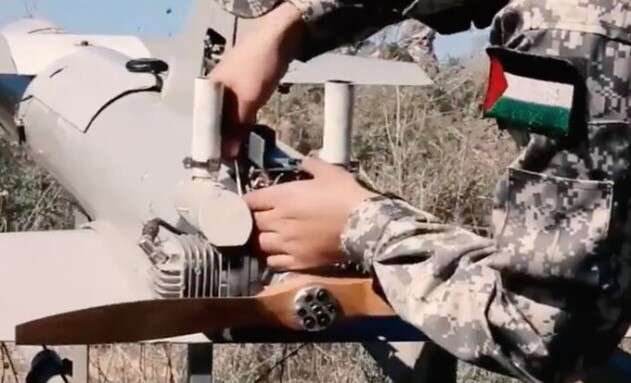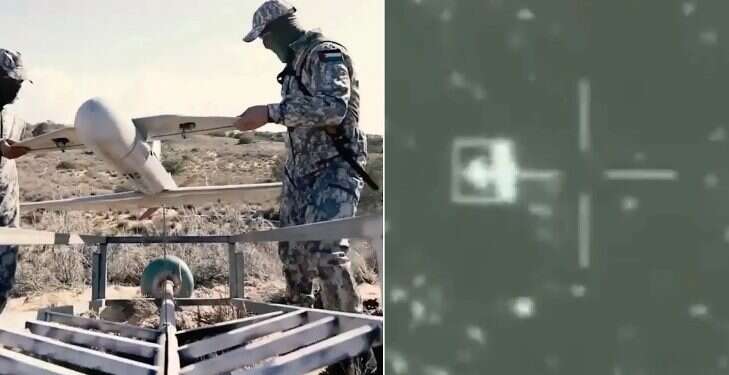In the recent round of hostilities between Israel and Hamas, Israel had to contend with a growing drone threat from the Gaza Strip – not only detecting and mitigating the threats in the field, but on social media, where Hamas has released dramatic videos displaying their drone tactics and tooling.
Follow Israel Hayom on Facebook and Twitter
While Israel has previously dealt with Iranian drones, it seems that Hamas has acquired a similar technology that enables the organization to use explosive-laden drones.
Israel intercepted six weaponized drones through various means. A number of them were intercepted by IAF fighter jets, while one was intercepted by the Iron Dome system in flight. These suicide drones were reportedly carrying around five kilograms (11 pounds) of explosive payload and were intended to avoid the Iron Dome defense system, unlike the regularly intercepted rockets.
These drones resemble the Iranian Ababil military drone but have been claimed as being developed and built locally by Izzedine al-Qassam Brigades, Hamas' military wing, and are named "Shehab." The Iranian HESA Ababil is notoriously affordable, designed mainly as a targeting drone with rudimentary surveillance capabilities and the capability to be used as a loitering munition ("suicide" or "kamikaze" drones).

Some observers have noted that while the engine of the Shehab and the Qasef-series drones share certain similarities, media released by Hamas shows that Commercial Off-The-Shelf (COTS) engine components are used in its drones, and they appear smaller in size. Hamas' drones also have a visible commercial GPS module for guiding the drones to their target.
As mentioned previously, the Iron Dome Defense system displayed the ability to intercept this type of emerging threat in combat. The Defense Ministry tested a range of complex scenarios (Aerial Threat Assessments) against the system, checking its ability to intercept multiple UAVs. However, compared to the cost of building a weaponized drone, the cost of using Iron Dome to intercept drones is economically disproportionate.
Drones as loitering munitions were hardly used by Hamas until the latest escalation, but there have been recorded instances of COTS drones being used for Intelligence, Surveillance and Reconnaissance (ISR). Additionally, recent innovative uses of drones by the Palestinian side include balloons with explosive payloads launched and sent into Israel over the border – a tactic that sees the balloons burst and the payload dropped, potentially bypassing defense infrastructure that might concentrate on high-speed and highly technical components.
On the other hand, there are a number of recorded cases in which the Israel Defense Forces used small drones (sUAS) of their own to conduct surveillance operations, when large military drones do not provide a tactical viewing advantage. Some of these drones have been successfully shot down and captured by Hamas, which publicized them on social media, although the IDF has responded that no important or sensitive data was lost through offensive forensics (the process for identifying information within an adversary's drone).
Both Hamas and Israel will likely continue to adopt the use of drones as they become cheaper, avoid detection more easily, and unlike a rocket – which leaves a trail of smoke – might not reveal their launch location.
The use of small consumer and commercial drones in conflict has been well documented since the war against ISIS. Cost-effective counter-drone systems (CUAS) that include Electronic Warfare (EC) and offensive cyber technologies to exploit and control non-military drones, such as the solutions offered by DroneSec, will continue to develop as countries call for strong intelligence in identifying and mitigating weaponized drones.
DroneSec is a cybersecurity and threat intelligence firm for drones that secures drone fleets and operations. DroneSec is the industry's most well-known and trusted partner for Drone Security and Counter-Drone training, with the "Drone Security Operators Certificate (DSOC)" being trusted by over 100+ organizations. Our team is made up of cyber-security professionals, military drone and military fighter jet pilots to enable safe and secure drone operations around the world.
Subscribe to Israel Hayom's daily newsletter and never miss our top stories!




